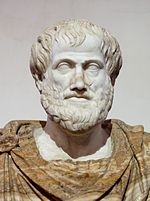|
|
| |
|
|
| |
|
|
|
|
| |
 |
| Aristotle, 384–322
BCE. |
Logic
Logic is the science of reasoning. Logic helps people
decide whether something is true or false.
A popular example of a syllogism given by Aristotle: |
- All men are mortal
- Socrates is a man
- Therefore, Socrates is mortal.
|
|
Logical proof
A logical proof is a list of statements. Each statement in
the proof is either an assumption or has been proven to
follow from earlier statements in the proof. A proof shows
that one statement, the conclusion, follows from the
assumptions. One can, for example, prove that "Aristotle is
mortal" follows from "Aristotle is a man" and "All men are
mortal". |
|
Uses
Logic is used by computers in what is called an
algorithm. An algorithm is sort of like a cooking
recipe; it tells the computer what to do and when to do
it.
Logic is used in mathematics. People who study math
create proofs that use logic to show that math facts are
correct. There is an area of mathematics called
mathematical logic that studies logic using mathematics.
Logic is also studied in philosophy. |
|
|
|
|
|
|
|
|
|
|
|
|
|
|
|
|
|
|
Search Fun Easy English |
|
|
|
|
|
|
|
|
|
|
|
|
|
|
|
About
Contact
Copyright
Resources
Site Map |